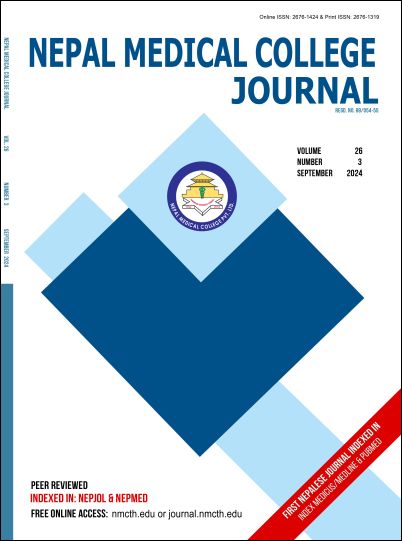Association between Abortion and Acceptance of Post abortion Contraception
DOI:
https://doi.org/10.3126/nmcj.v26i3.69881Keywords:
Abortion, medical abortion (MA), manual vacuum aspiration (MVA), short acting reversible contraception (SARC), long acting reversible contraception (LARC)Abstract
Post-abortion contraceptive uptake is essential in reproductive health, as it helps to identify women’s contraceptive needs, reduce unintended pregnancies and prevent subsequent abortions. Integrating abortion services with family planning counselling at all levels of health facilities can enhance contraceptive acceptance. This study aimed to evaluate the acceptance of various family planning methods following different abortion services over one year period, at a family planning center, Department of Obstetrics and Gynecology Tribhuvan University Teaching Hospital. This study analyzed the women who participated in contraceptive counselling and accepted different types of contraceptives following different methods of first and second trimester abortions services. The study included women who received post-abortion contraceptive counselling and services, excluding those with termination beyond the second trimester or those seeking only postpartum contraceptive counselling or post-abortion care. It aimed to analyze the association between different methods of abortion and contraception acceptance post-abortion. Among 100 women who had spontaneous and induced abortions, 89% received post-abortion counselling and 75% accepted various types of contraception immediately after abortion. About one third of women were aged 25–29 years (30%), 99% were married, 40% were graduates and 48% were housewives. Abortion methods included medical abortion (62%), manual vacuum aspiration (MVA) (35%) and dilatation and evacuation (3%). Contraceptive acceptance rates were: short-acting reversible contraception (SARC) 60%, long-acting reversible contraception (LARC) 14%, and permanent methods 1%. Among medical abortion recipients, most chose SARC (43%) followed by LARC (4%). For those undergoing MVA, 16% chose SARC, and 9% chose LARC. Condoms were the most accepted SARC method (22%). The study demonstrated that post-abortion counseling significantly increases acceptance of various contraceptive methods, with SARC being the predominant choice, especially condoms among users.
Downloads
Downloads
Published
How to Cite
Issue
Section
License
Copyright (c) 2024 Nepal Medical College Journal

This work is licensed under a Creative Commons Attribution 4.0 International License.
This license enables reusers to distribute, remix, adapt, and build upon the material in any medium or format, so long as attribution is given to the creator. The license allows for commercial use.




